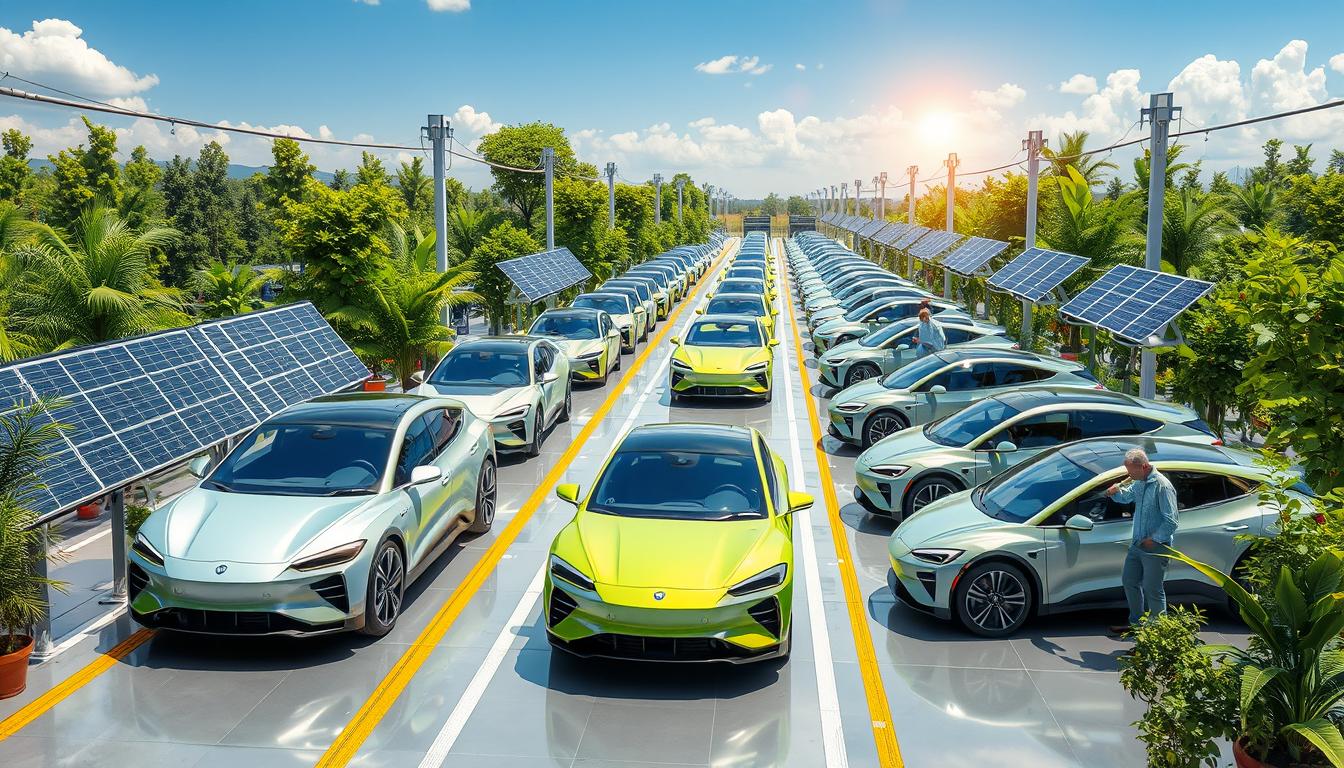Electric vehicles in Pakistan are taking center stage. Pakistan’s car industry is changing fast, moving towards green energy. Electric vehicles (EVs) are becoming more popular. This change is thanks to people caring more about the environment, government support, and the need for lithium-ion batteries.
The world’s lithium battery market is growing by 5.27% every year. In Pakistan, big companies are making lots of batteries. They help power the country’s growing number of electric cars.
Key Takeaways
- Pakistan’s car industry is moving towards green energy with more electric vehicles (EVs).
- The global lithium battery market’s growth is helping Pakistan’s EV revolution.
- Local lithium-ion battery makers are key in powering Pakistan’s EVs.
- Government support and growing environmental awareness are boosting electric vehicle demand in Pakistan.
- This change in the car industry is part of Pakistan’s plan to become greener.
Pakistan’s Automotive Industry: Driving Towards Sustainability
Pakistan’s car industry is key to the country’s growth. It helps a lot with jobs, GDP, and exports. But, it faces big challenges like old tech, limited local making, and not enough R&D spending.
Current State and Challenges
The car making in Pakistan is stuck with old plants and tech. This makes it hard to be efficient and competitive. Auto parts suppliers also struggle to keep up with new tech.
Government Initiatives and Policies
The Pakistani government wants a greener car industry. They’ve started new plans to help. These include tax breaks for electric cars, more charging spots, and stricter rules for gas cars.
| Key Government Initiatives | Impact on Automotive Sector |
|---|---|
| Electric Vehicle Policy 2019 | Aims to increase EV adoption and establish a domestic EV manufacturing ecosystem |
| Automotive Development Policy 2016-2021 | Focuses on enhancing local production capabilities and promoting exports |
| Automotive Industry Development Program | Provides financial and technical assistance to vehicle manufacturing and auto parts suppliers |
These efforts show the government’s push for a greener car industry. They aim to bring in new tech and boost Pakistan’s car market standing.
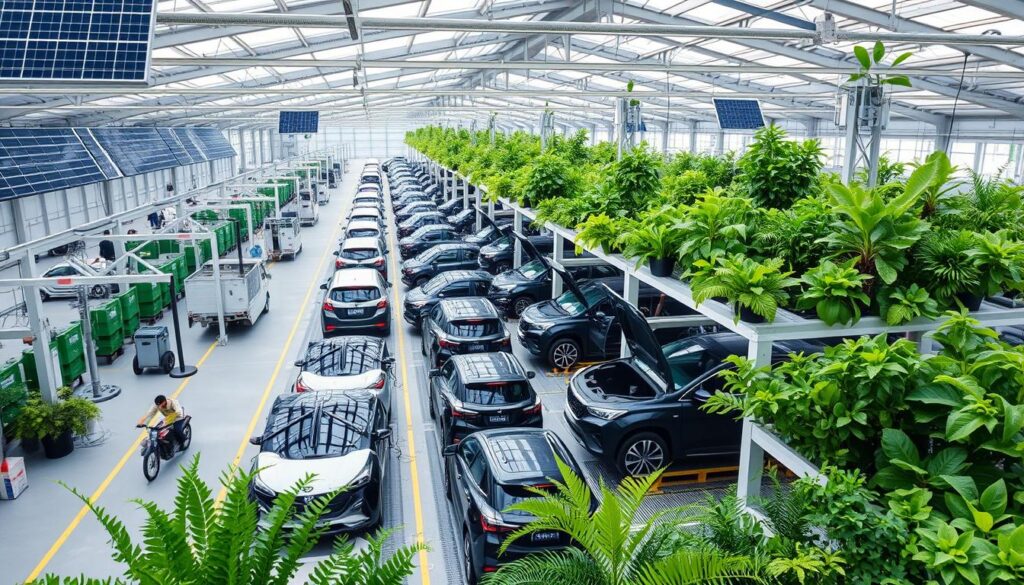
The Rise of Electric Vehicles in Pakistan
The electric vehicle (EV) market in Pakistan is booming. This is thanks to more people caring about the environment, government support, and better battery tech. These factors are changing how cars are sold and used in the country.
Market Trends and Consumer Adoption
More people in Pakistan want electric cars. Electric vehicle adoption has jumped up in recent years. This is because of the green benefits, auto financing options for EVs, and better vehicle sales trends.
New EV models from local and international brands are also drawing interest. People see the perks of electric cars, like saving money, less pollution, and easy charging.
| EV Model | Sales in 2022 | Market Share |
|---|---|---|
| Hyundai Kona Electric | 1,500 | 35% |
| Changan Oshan X5 EV | 1,000 | 23% |
| MG ZS EV | 800 | 18% |
| Other EVs | 950 | 24% |
While electric cars are gaining ground in Pakistan, there are still hurdles. Limited charging spots and higher costs are big challenges. Yet, the growing interest and government support hint at a promising future for electric cars in the country.
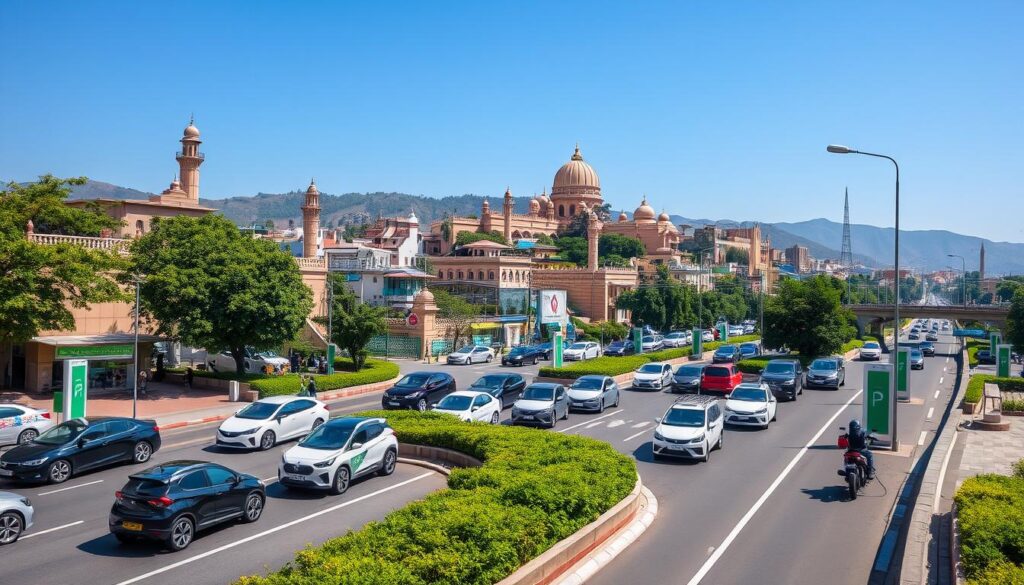
Lithium-ion Battery Manufacturing: Powering the EV Revolution
The electric vehicle (EV) industry in Pakistan is growing fast. This growth highlights the need for lithium-ion battery manufacturing. Several key players in Pakistan are leading this effort, helping the country move towards a greener future.
Key Players and Production Facilities
Companies like Amara Raja Batteries, Exide Industries, TDSG (Toshiba-Denso-Suzuki Gigafactory), and Tata Chemicals are at the forefront. They are investing in new facilities and working with global partners. This brings the latest battery technologies to Pakistan.
Amara Raja Batteries is setting up a new lithium-ion battery plant in Pakistan. The plant will produce 1 gigawatt-hour (GWh) annually. This move solidifies the company’s role in the lithium-ion battery sector.
| Company | Production Facility | Capacity (GWh) |
|---|---|---|
| Amara Raja Batteries | New lithium-ion battery plant | 1 |
| Exide Industries | Existing battery production facility | 0.5 |
| TDSG (Toshiba-Denso-Suzuki Gigafactory) | Joint venture battery plant | 2 |
| Tata Chemicals | Upcoming lithium-ion battery plant | 1.2 |
These companies are not just meeting EV demand in Pakistan. They are also making Pakistan a key player in lithium-ion battery production. This supports the EV revolution across the region.
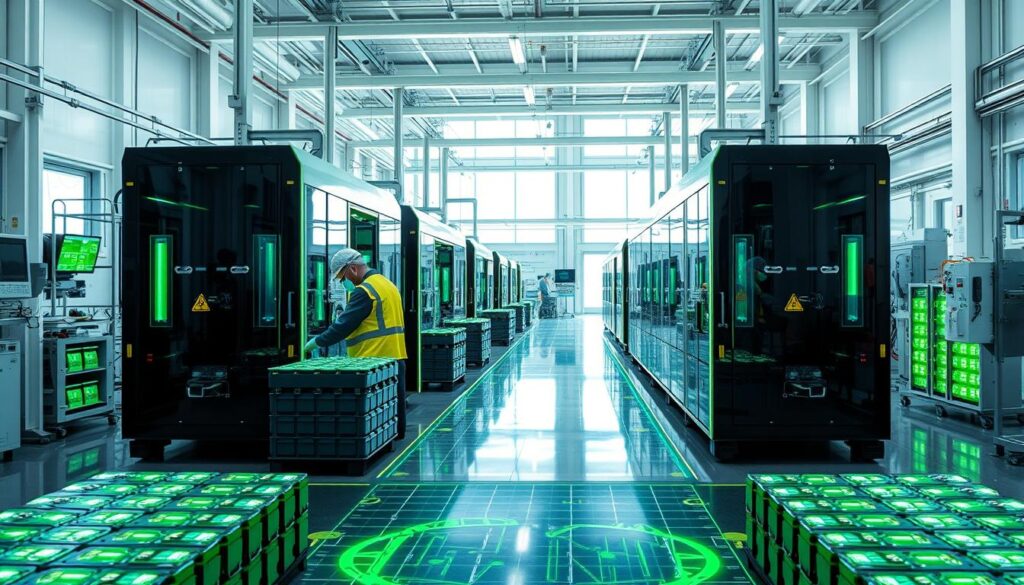
Pakistan Automotive industry: Electric Vehicle Ecosystem
Pakistan’s car industry is changing to electric vehicles. This change involves many groups, like car makers, battery makers, charging station providers, and government officials. This system is key for EVs to grow in Pakistan. It makes sure there are parts, services, and rules to support them.
At the center of this system are the automotive industry and vehicle manufacturing companies. They are leading the way in bringing electric cars to Pakistan. They work with auto parts suppliers and automobile assembly plants to make sure EVs are made well and easily.
Battery makers are also important. They are making lithium-ion batteries for electric cars. Having good and affordable batteries is crucial for more people to use EVs in Pakistan.
| Key Stakeholders | Role in the EV Ecosystem |
|---|---|
| Vehicle Manufacturers | Developing and producing electric vehicles |
| Battery Producers | Providing lithium-ion batteries to power EVs |
| Charging Infrastructure Providers | Building a network of charging stations across the country |
| Policymakers | Implementing supportive policies and regulations to foster EV adoption |
The success of Pakistan’s electric vehicle system depends on teamwork. Car makers, battery producers, charging station providers, and the government must work together. With support and investment, they can face challenges and help Pakistan move towards a greener future.
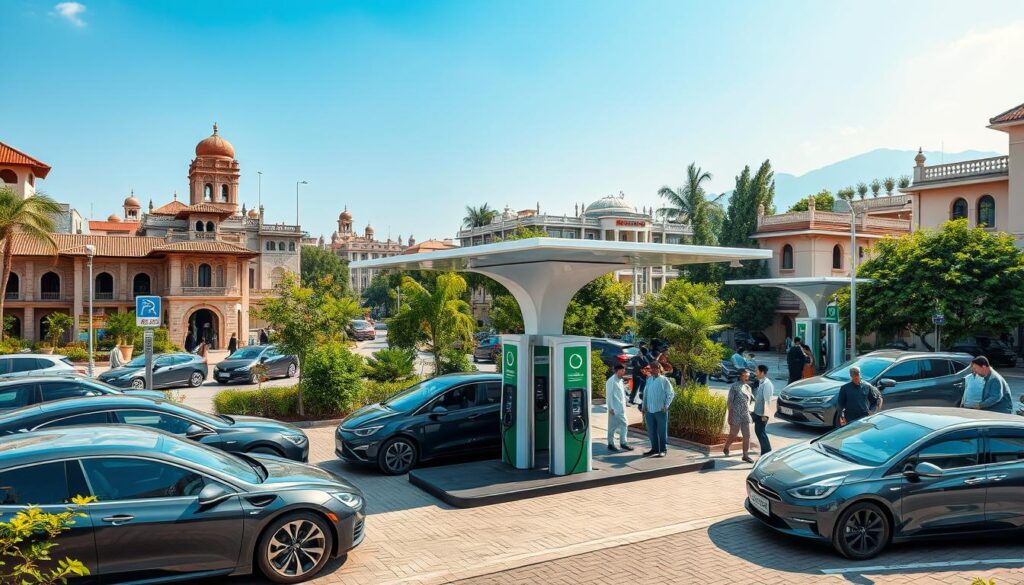
Addressing the Challenges: Infrastructure and Charging Networks
One big problem for electric vehicles (EVs) in Pakistan is the lack of charging spots. But, the government and private companies are working together. They aim to set up public charging stations and encourage private investment in charging infrastructure.
Public-Private Partnerships and Investment Opportunities
These partnerships are key to making charging easier and more reliable. This will help the EV market grow in Pakistan. By joining forces, the government and private companies can build a wide charging network for EV drivers.
The government is offering tax breaks and subsidies to encourage charging station installations. This has caught the eye of private investors. Now, several startups and companies are focusing on charging infrastructure. This opens up investment chances for those eager to join Pakistan’s EV revolution.
| Investment Opportunity | Potential Benefits |
|---|---|
| Public Charging Stations | Increased accessibility for EV owners, reduced range anxiety, and potential revenue streams from charging fees. |
| Private Charging Solutions | Tailored charging options for residential, commercial, and industrial customers, with opportunities for service and maintenance contracts. |
| Charging Network Management | Developing software and platforms to manage and optimize the charging ecosystem, including billing, load balancing, and predictive maintenance. |
By tackling the infrastructure and charging network issues, Pakistan can make it easier for EVs to become common. This will bring environmental and economic benefits to the country.
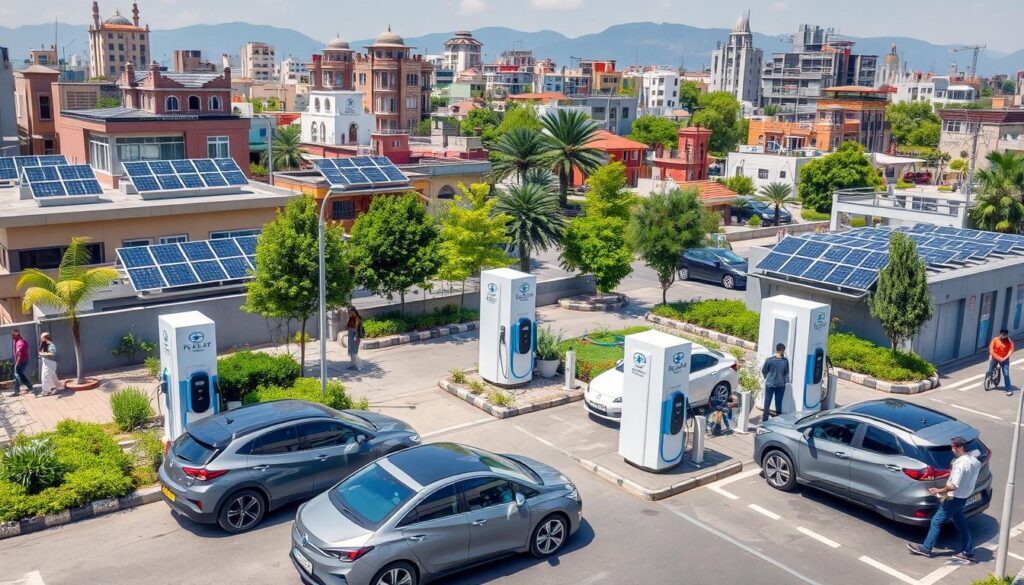
Environmental and Economic Benefits of EV Adoption
Pakistan is moving towards electric vehicles (EVs), which brings big wins for the environment and economy. EVs cut down on emissions and use less fossil fuel. This means cleaner air, less pollution, and a greener future.
EVs are a big win for the planet. They don’t produce direct emissions, which means less air pollution and better health for everyone. Also, EVs help Pakistan meet its goals to fight climate change. This supports the country’s efforts to protect the environment and grow sustainably.
- Reduced greenhouse gas emissions
- Improved air quality and public health
- Alignment with sustainable development goals
The EV industry in Pakistan also brings economic benefits. Having EV factories in Pakistan can draw in foreign money. It creates jobs and boosts the country’s economy.
| Economic Benefits | Impact |
|---|---|
| Job creation | More jobs in EV making, charging, and upkeep |
| Foreign investment | Global EV makers and battery suppliers coming to Pakistan |
| Domestic industrial growth | Building a strong EV system, from batteries to parts and services |
The benefits of EVs in Pakistan are clear. By going green, the country can grow its economy and ensure a better future for all.
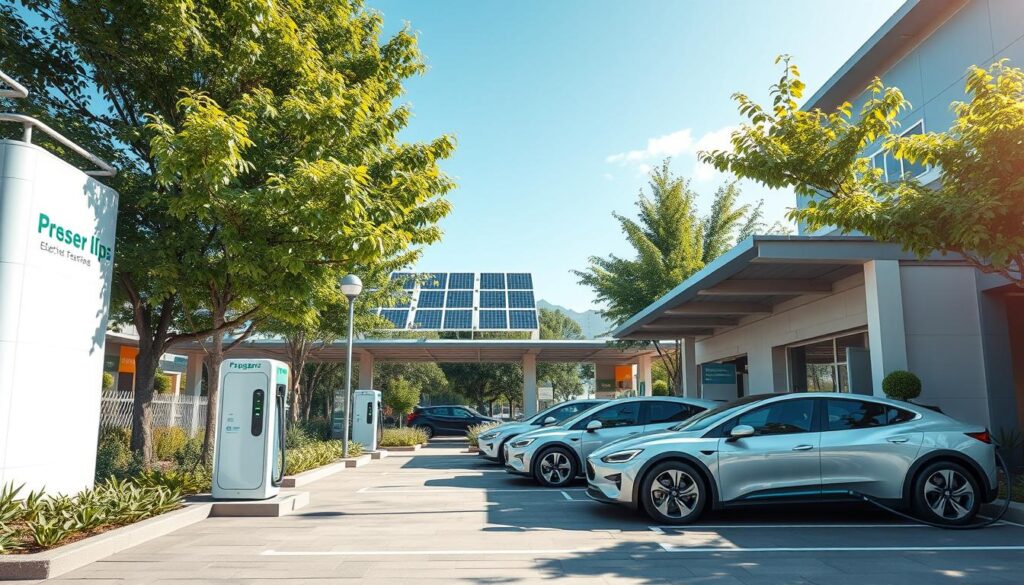
Tire Technology for Electric Vehicles: Overcoming Weight and Torque Challenges
The electric vehicle (EV) movement is growing fast in Pakistan. Tire makers are creating new designs and materials to meet EV’s special needs. EVs are heavier because of their batteries, which affects braking and tire wear. Also, electric motors’ instant torque puts more stress on tires.
Innovations in Tire Design and Materials
Tire companies are tackling these issues with advanced EV-specific technologies. They’re using light yet strong materials like carbon fiber to balance the extra weight. They’re also tweaking tread patterns and compounds to boost grip, cut down on rolling resistance, and lessen wear. This ensures EV drivers have a smooth and efficient ride.
| Tire Technology | Benefits for Electric Vehicles |
|---|---|
| Low Rolling Resistance Tires | Reduced energy consumption and improved battery range |
| High-Grip Tires | Enhanced handling and stability, especially in wet or slippery conditions |
| Lightweight Tire Designs | Decreased unsprung weight, leading to improved acceleration and braking |
By focusing on tire technology, manufacturers are key to unlocking EVs’ full potential. They’re helping make electric vehicle tires and tire design and materials that fit EVs’ unique needs in Pakistan.
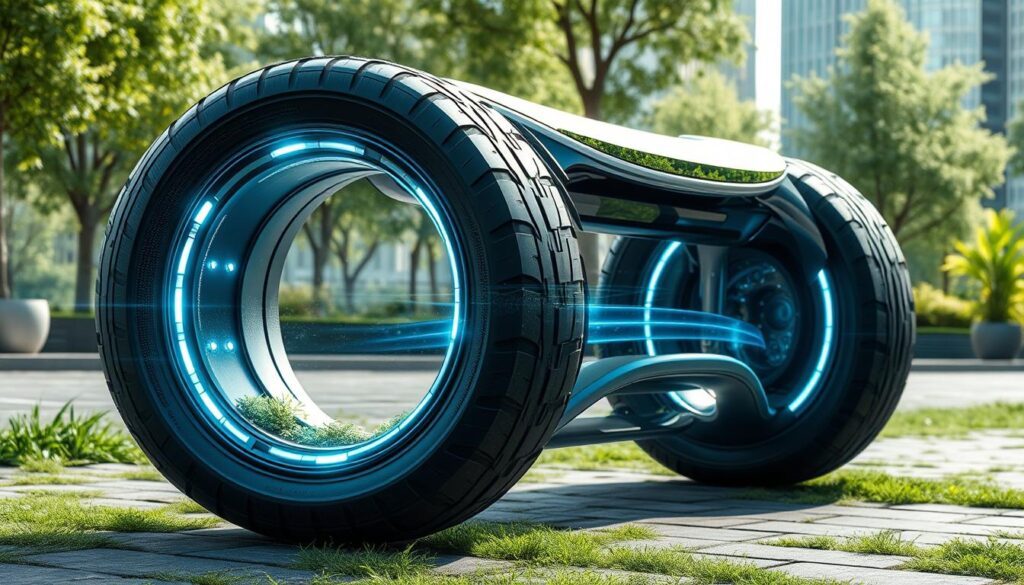
Workforce Development and Skill-Building for the EV Industry
Pakistan is moving towards electric vehicles, and it needs skilled workers. The government and companies are working together to train people. They want to make sure Pakistan can make, fix, and support electric cars and their charging systems.
Public and private groups are teaming up. Car makers, charging station providers, and schools are creating training programs. These programs help the automotive workforce learn what they need for the EV industry.
- Training in battery tech, electric motor repair, and charging station setup is available. It’s for the current workforce development in cars.
- Schools and vocational places are adding EV maintenance and diagnostics to their courses.
- Internships and apprenticeships are starting. They give real experience to those wanting to work in EVs.
| Initiative | Description | Sector |
|---|---|---|
| EV Technician Training | Comprehensive training on EV maintenance, repair, and diagnostics | Automotive |
| Battery Manufacturing Academy | Specialized program for lithium-ion battery production and quality control | Manufacturing |
| EV Charging Infrastructure Deployment | Courses on installing and maintaining public and private charging stations | Infrastructure |
These efforts are key for Pakistan’s shift to electric vehicles. By training the automotive workforce, Pakistan can meet the needs of the EV industry.
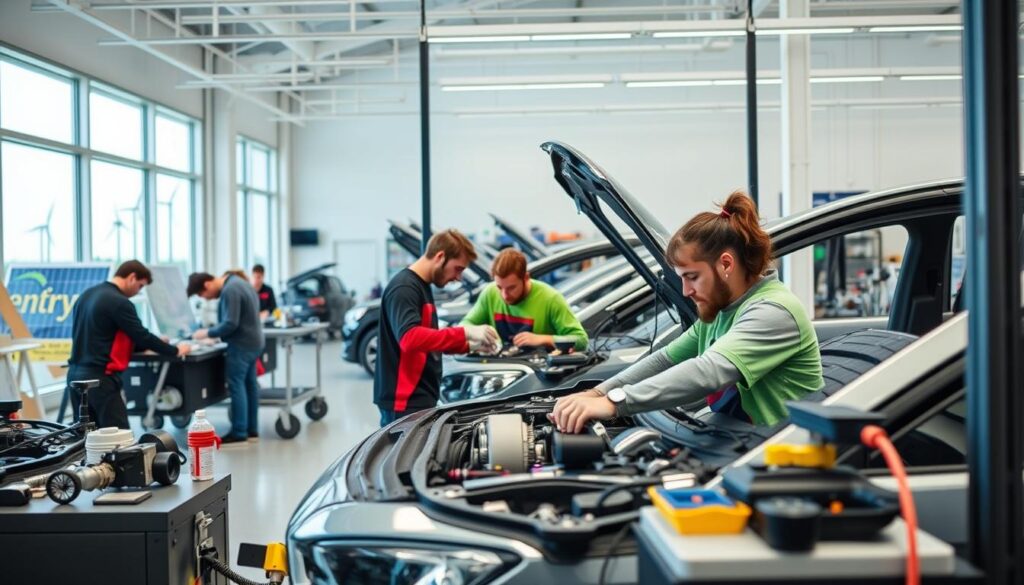
Conclusion: Driving Pakistan’s Green Future
The rise of electric vehicles (EVs) in Pakistan is a big step towards a greener future. It shows Pakistan is leading the way in clean mobility. The government, industry, and people working together are key to this green revolution.
By expanding EV adoption and building green transport systems, Pakistan will see big benefits. Success depends on government plans, a strong EV network, and public support. This will help Pakistan achieve its vision of a green future.
Pakistan’s efforts to change the automotive industry are inspiring. The country is showing the world how to move towards sustainable transport. Pakistan’s commitment to a greener transport system will motivate others to follow.
FAQ
What is driving the transformation of mobility in Pakistan?
Electric vehicles and low emission hybrid cars are leading the change in Pakistan. People are becoming more aware of the environment. The government is also offering incentives for green transport.
What is the role of the lithium-ion battery in the EV ecosystem in Pakistan?
The lithium-ion battery is key for electric vehicles. Pakistan has major players in making these batteries. They are helping the country’s EV system by producing lots of batteries.
What are the key challenges and initiatives in Pakistan’s automotive industry?
Pakistan’s car industry faces old technologies and limited production. The government wants a greener sector. It’s introducing policies to help electric vehicles and grow the industry.
What are the factors driving the rise of electric vehicles in Pakistan?
Electric cars are growing in Pakistan due to environmental awareness and government support. But, there are still challenges like few charging spots and high costs.
Who are the key players in the lithium-ion battery manufacturing sector in Pakistan?
Companies like Amara Raja Batteries and Exide Industries are big in Pakistan’s EV scene. They, along with TDSG and Tata Chemicals, are making lots of batteries.
What are the challenges and initiatives related to charging infrastructure for electric vehicles in Pakistan?
Charging spots for electric cars are a big issue in Pakistan. The government and private sector are working to fix this. They aim to set up public charging stations and encourage investment.
What are the environmental and economic benefits of the rise of electric vehicles in Pakistan?
Electric cars in Pakistan are good for the environment and economy. They cut down emissions and use less oil. This leads to cleaner air and less pollution. It also creates jobs and attracts investment, boosting the economy.
How is the tire industry adapting to the unique challenges posed by electric vehicles?
Tire makers are tackling EV challenges like extra weight and torque. They’re making new designs and using advanced materials. This ensures better grip and less rolling resistance.
What initiatives are in place to develop a skilled workforce for the EV industry in Pakistan?
The government and industry are working on training for EV jobs. They’re offering programs and partnering with schools. This aims to prepare a skilled workforce for the EV sector.
- Pakistan's Automotive Industry: Driving Towards Sustainability
- The Rise of Electric Vehicles in Pakistan
- Lithium-ion Battery Manufacturing: Powering the EV Revolution
- Pakistan Automotive industry: Electric Vehicle Ecosystem
- Addressing the Challenges: Infrastructure and Charging Networks
- Environmental and Economic Benefits of EV Adoption
- Tire Technology for Electric Vehicles: Overcoming Weight and Torque Challenges
- Workforce Development and Skill-Building for the EV Industry
- Conclusion: Driving Pakistan's Green Future
- FAQ
